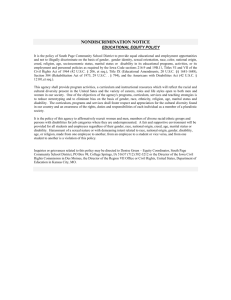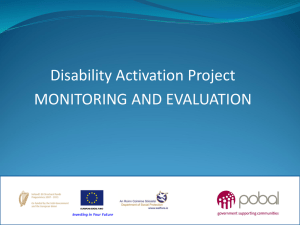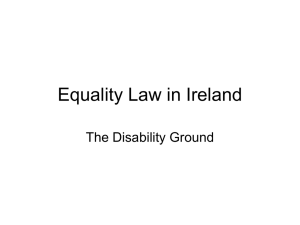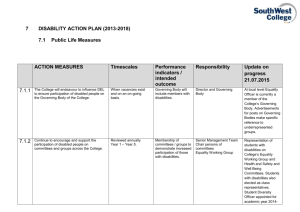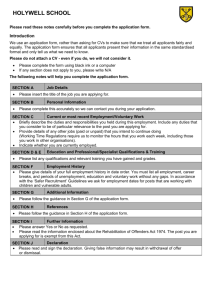Appendix 5 – Support of disabled students on practice placement
advertisement
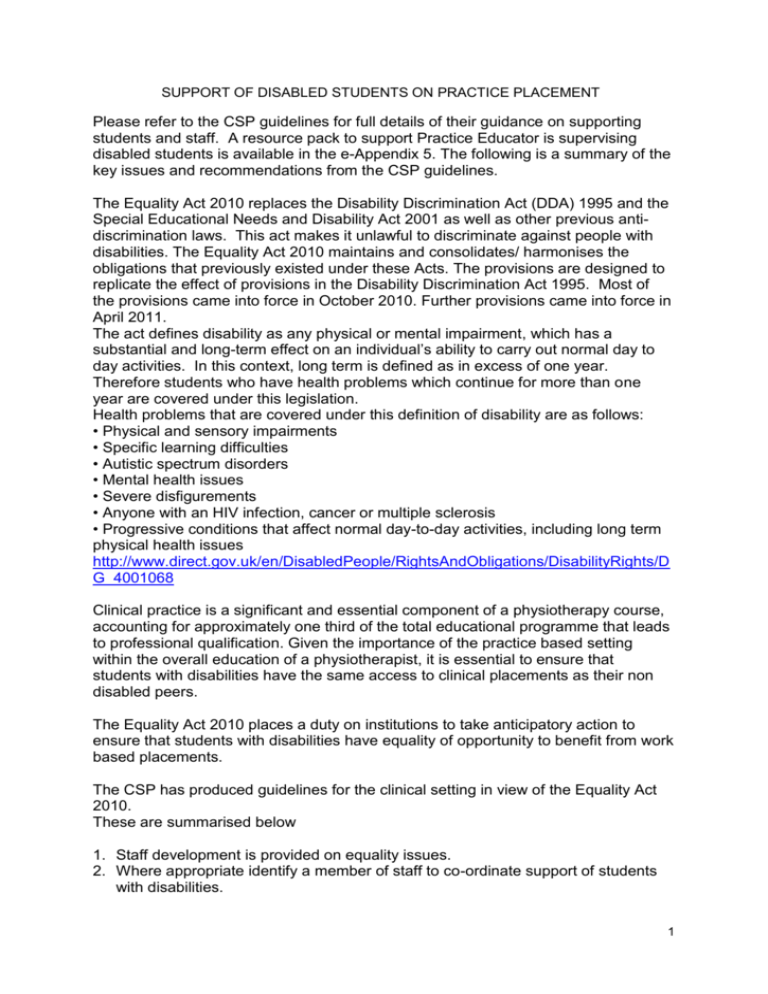
SUPPORT OF DISABLED STUDENTS ON PRACTICE PLACEMENT Please refer to the CSP guidelines for full details of their guidance on supporting students and staff. A resource pack to support Practice Educator is supervising disabled students is available in the e-Appendix 5. The following is a summary of the key issues and recommendations from the CSP guidelines. The Equality Act 2010 replaces the Disability Discrimination Act (DDA) 1995 and the Special Educational Needs and Disability Act 2001 as well as other previous antidiscrimination laws. This act makes it unlawful to discriminate against people with disabilities. The Equality Act 2010 maintains and consolidates/ harmonises the obligations that previously existed under these Acts. The provisions are designed to replicate the effect of provisions in the Disability Discrimination Act 1995. Most of the provisions came into force in October 2010. Further provisions came into force in April 2011. The act defines disability as any physical or mental impairment, which has a substantial and long-term effect on an individual’s ability to carry out normal day to day activities. In this context, long term is defined as in excess of one year. Therefore students who have health problems which continue for more than one year are covered under this legislation. Health problems that are covered under this definition of disability are as follows: • Physical and sensory impairments • Specific learning difficulties • Autistic spectrum disorders • Mental health issues • Severe disfigurements • Anyone with an HIV infection, cancer or multiple sclerosis • Progressive conditions that affect normal day-to-day activities, including long term physical health issues http://www.direct.gov.uk/en/DisabledPeople/RightsAndObligations/DisabilityRights/D G_4001068 Clinical practice is a significant and essential component of a physiotherapy course, accounting for approximately one third of the total educational programme that leads to professional qualification. Given the importance of the practice based setting within the overall education of a physiotherapist, it is essential to ensure that students with disabilities have the same access to clinical placements as their non disabled peers. The Equality Act 2010 places a duty on institutions to take anticipatory action to ensure that students with disabilities have equality of opportunity to benefit from work based placements. The CSP has produced guidelines for the clinical setting in view of the Equality Act 2010. These are summarised below 1. Staff development is provided on equality issues. 2. Where appropriate identify a member of staff to co-ordinate support of students with disabilities. 1 3. The basis of this role is one of co-ordination and liaison. 4. Adjustments are made in anticipation of students arriving on clinical placement e.g. are work patterns flexible enough? 5. Monitoring and modification of adjustments for their effectiveness. 6. Data protection, staff members do not need to know specific details about a person’s medical condition/disability in order to implement support measures. Information should be given on a need to know basis only. 7. Students may need specialist equipment to enable full participation in clinical education. It is also important that appropriate and secure accommodation is arranged. Disclosure For a variety of reasons students do not always find it easy to disclose information about their disability. According to the data protection act, this information pertaining to a person’s disability can only be given to others if the student has given his/her explicit permission. It is recommended that departments ask all students who contact clinical sites prior to the commencement of their placement whether they have any specific support requirements. A second opportunity occurs during negotiation of the learning contract. Students have the right not to disclose their disability or requirements but they must understand that this is likely to result in no specific support being put in place. However they are at liberty to disclose their disability at any point during placement. Students cannot be compelled to disclose information about personal disabilities to patients. Educators have a responsibility to provide a framework within which students can make an informed decision and this decision should be agreed and recorded. Ref: CSP. 2010. Into Physiotherapy. Welcoming and Supporting Disabled Students. Available on request via the CSP Enquiry Handling Units, including alternative formats (enquiries@csp.org.uk; tel: 0207 306 666. 2

